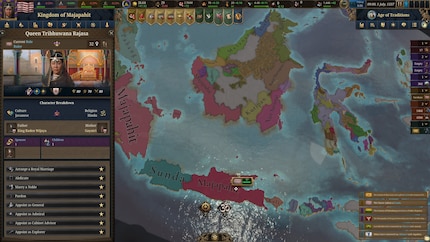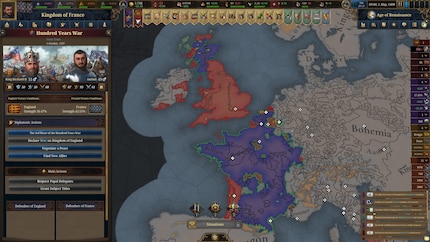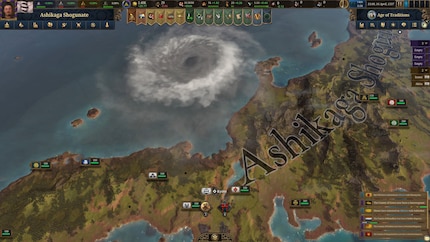
"Europa Universalis V" announced: interactive history lessons
Paradox has been talking about "Project Caesar" for a long time. It is now clear that it is "Europa Universalis V". The successor to the Grand Strategy masterpiece "EU IV" aims to reinvent itself without sacrificing complexity.
Do you know Georg Kastrati, better known as Skanderbeg? If you're nodding now, you either have family roots in the Balkans, studied history or played «Europa Universalis IV» ( «EUIV» for short). I belong to the latter group and recognise Skanderbeg as probably the best head of state in the game. The Albanian national hero successfully defended his country against Ottoman expansion in the 15th century and left his mark on the history of the Balkans and Europe.
In «EUIV» I can control the fate of a country, for example Albania, from 1444 onwards. The entire world map is playable, from Switzerland to small islands like Sulu in the southern Philippines. This is just as absurd as it sounds. Leaders, population, military, diplomatic relations and trade are simulated down to the smallest detail. The strategy masterpiece, which was released in 2013 and has been expanded several times, is now getting a sequel.
The emperor's new clothes
What has been announced for months as «Project Caesar» has now been confirmed as «Europe Universalis V». A release date is not yet known. Paradox is not reinventing the game. There is still no goal in the true sense of the word. If I, as Switzerland, don't want to expand my territory and want to remain as neutral as possible, I can
I can try to do that just as much as I can try to take over the world. Nevertheless, the developers have updated various aspects of the game.
Even more detailed
Over 30,000 provinces, 2,100 nations, 2,000 cultures and 300 religions. «EU V» is already one of the most ambitious Grand Strategy projects at launch. The predecessor had no less than 22 DLCs. The new edition aims to continue in this vein and focuses on an even more detailed map right from the start. Each day is divided into hours. In a game that simulates several centuries from the end of the Middle Ages to industrialisation, this is an extreme level of detail.

Source: Paradox
Goodbye Mana, hello Pops
The often criticised mana system, in which you collected admin, diplo and military points to spend later on political issues, declarations of war or the army, has been dropped. Instead, «EU V» relies on a system with population groups (pops). Paradox fans are already familiar with this from «Victoria 3» or «Stellaris». Satisfied Pops are important as they recruit into the military, trade or cultivate fields. Disease, hunger or political tensions affect their productivity and therefore the stability of your empire.
The Pops are not a homogeneous mass. The population is made up of different groups, religions and attitudes, which can cause internal political friction. The Protestant Zurich nobility were unlikely to get along with the Catholic peasants of the original cantons straight away.
A hundred years more
Instead of 1444, the game now starts in 1337, so you have over 100 more years to play. This makes the game particularly exciting as France or England, as it begins with the Hundred Years' War. In the previous game, you could only enter «» at the end of the war. It is not clear how detailed the simulation of Switzerland will be, such as the Battle of Grynau between the Habsburgs and the people of Zurich in 1337.

Source: Paradox
Let the AI do it
Grand strategy games are particularly complex to get into, as various mechanics are intertwined. What makes it so appealing for some is too much for others. This is where «EU V» helps you with automation. If you don't fancy counting peas, you can leave the bookkeeping to the AI. You can also give your military tasks, such as defending the borders or hunting down enemy armies.
Climate change
The world map is not only visually more detailed, but also game mechanically. In future, provinces will have specific features: Terrain shapes, vegetation and climate zones influence the movement, supply and exhaustion of armies. Frozen seas open up paths where there used to be none. Desert areas make conquests more difficult and make weather conditions a relevant factor.

Source: Paradox
Polished crown jewels
Graphically, «EU V» is tidier than its predecessor. The map is a little more detailed and the menus appear slightly clearer. However, the game remains a grand strategy game. It therefore has more to do with Excel than with «Super Mario».
The pressure is mounting
These are just a few of the innovations that Paradox is presenting to us, and they give us hope for a worthy successor. The publisher is under pressure: Most recently, «Cities Skyline 2» made headlines with its technically miserable state. The life simulation «Life by you» was even cancelled immediately. The success of «Europa Universalis V» would bring peace to the Swedish company. Initial previews give hope.
When I flew the family nest over 15 years ago, I suddenly had to cook for myself. But it wasn’t long until this necessity became a virtue. Today, rattling those pots and pans is a fundamental part of my life. I’m a true foodie and devour everything from junk food to star-awarded cuisine. Literally. I eat way too fast.
From the latest iPhone to the return of 80s fashion. The editorial team will help you make sense of it all.
Show all